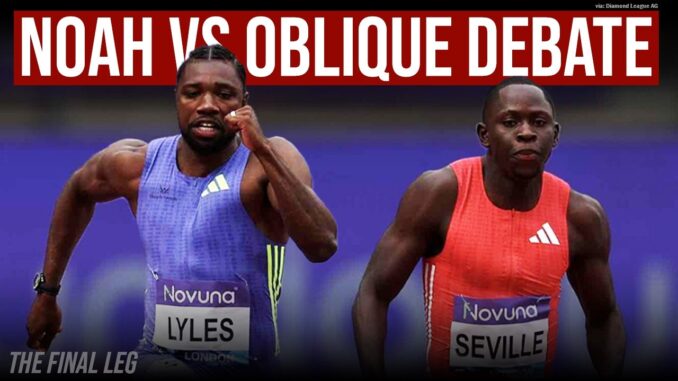
The debate between Oblique Seville and Noah Lyles is more than a contest of speed — it is a clash of philosophies, temperaments, potentials, and legacy. The YouTube video titled “Oblique Seville vs Noah Lyles: A Debate on Skill & Talent + Who Will REALLY Win Gold in 2027” invites us to consider not only who is faster today, but who has the attributes to dominate the sprinting world in the years ahead.
Firstly, the comparison hinges on what we mean by skill and talent. Talent connotes raw, natural ability: innate speed, fast twitch muscle fibres, raw explosiveness out of the blocks. Skill suggests refinement, technique, race intelligence, psychological composure, ability to adjust mid-race. Noah Lyles, as a more experienced athlete, often gets credit for combining raw speed with race savvy; he has developed a consistency at the global level. Seville, on the other hand, may be seen as possessing great natural talent and the capacity to sharpen his skill further. The video likely explores how much each runner leans on talent versus cultivated skill, and which approach is more sustainable over time.
Secondly, there is the matter of track record and consistency. Lyles has built a formidable resume, with championship titles and strong performances across global competitions. Seville, although younger, has shown flashes of brilliance, occasionally beating top-tier competition. Indeed, in 2025, Seville defeated Noah Lyles to win gold in the 100 m at the World Championships, timing a personal best of 9.77 seconds. That result adds weight to the argument that Seville is already bridging the gap from potential to realized dominance.
Thirdly, the video’s subtitle — “Who will REALLY win gold in 2027?” — forces us to extrapolate: which athlete has more upside, greater longevity, or a better chance of peaking in that timeframe? Lyles, as a more mature athlete, must maintain his performance and avoid injury or decline. Seville, younger, potentially still ascending, may have more room for improvement. If Seville continues refining his technique, gaining composure under pressure, and avoiding the plateaus that chase many rising stars, he might overtake Lyles by 2027.
Beyond pure performance, psychological resilience and race temperament matter. In high-stakes finals, the ability to manage nerves, recover from a mistimed start, or adapt to weather and conditions becomes pivotal. The video likely discusses how each athlete handles pressure and adversity. Lyles has had high-pressure races before; Seville’s relative youth means he may still be proving his consistency under fire.
Another dimension is injury risk and longevity. Sprinting at elite level is punishing. How they train, recover, manage stress, and adapt with age are crucial variables. Even the fastest sprinter might fade if plagued by repeated injuries. The discussion may speculate on which athlete maintains peak health into 2027 and beyond.
Finally, history favors neither permanently; track records shift, new challengers emerge, and surprises happen. But from the evidence so far, Seville’s recent victories (including toppling Lyles) suggest he is not merely a hopeful prospect but a rising force in the sprinting world. If he continues evolving — blending his raw speed with refined racing intelligence — he could be the favorite to win global gold in 2027. Lyles, conversely, must defend his status, stay fresh, and adapt to evolving competition.
In conclusion, the video’s framing encourages us not to focus solely on present standings but to ask: who will emerge as the champion of tomorrow? The Seville–Lyles debate is compelling because it highlights that greatness is not judged only by raw ability or past titles, but by trajectory, growth, consistency, and mental fortitude. As of now, Seville’s momentum and youth tilt the picture in his favor, but Lyles’ experience and proven record keep the contest very much alive.
If you like, I can turn this into an article, speech, or shorter summary — what format do you prefer?
Be the first to comment